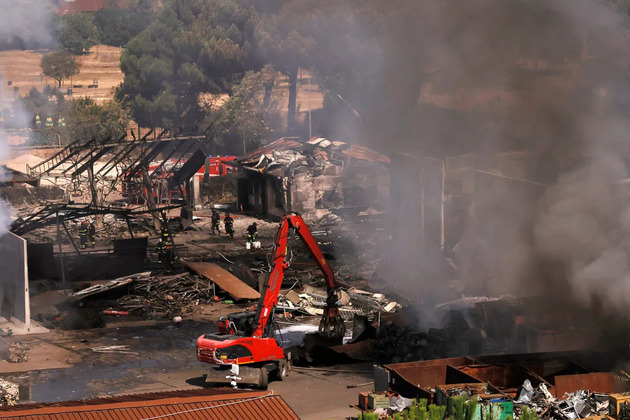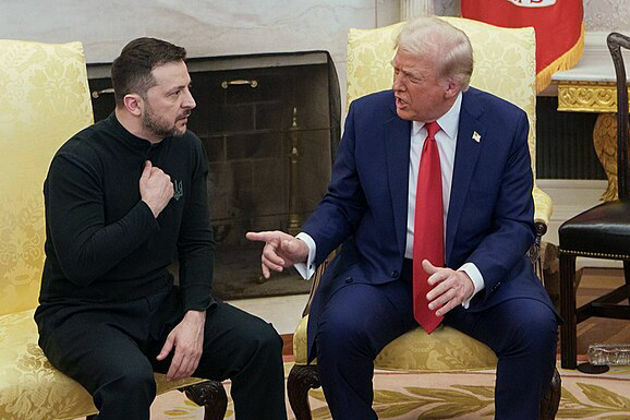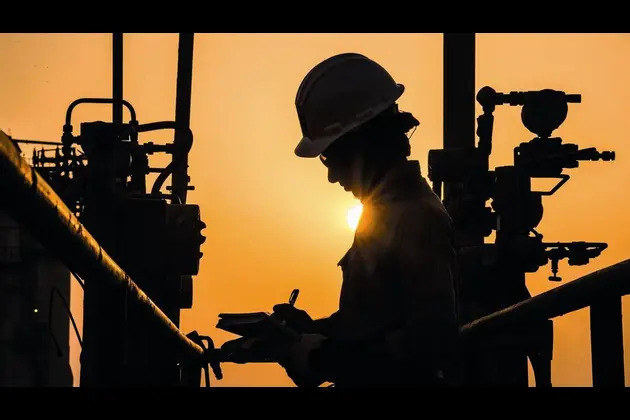Can you trust climate information? How and why powerful players are misleading the public
The Conversation
08 Jul 2025, 13:54 GMT+10

Ten years ago, the world committed itself to keeping global warming well below 2C (and preferably below 1.5C) above the pre-industrial era. This would be done by reducing greenhouse gas emissions significantly by 2030 and ending all human-caused greenhouse gas emissions by 2050. This was the time of promises, with 195 countries signing up to the legally binding, global treaty on climate change, the Paris Agreement.
Ten years on, however, the climate crisis is more urgent than ever. According to the United Nations:
The first 12-month period to exceed 1.5C as an average was February 2023-January 2024, boosted by El Nino, when the average temperature worldwide was estimated to be 1.52C higher than 1850-1900.
There's a disconnect between stated policies and actual practices, and we wanted to find out why.
We are media and communication researchers focusing on environmental communication. Recently, we joined a team of 14 researchers who investigated misinformation about climate change for the International Panel on the Information Environment.
Read more: Climate misinformation is rife on social media - and poised to get worse
Our team carried out the most comprehensive review to date of scientific research on climate misinformation and disinformation. Climate misinformation is when people make mistaken claims about climate change and spread incorrect information. Climate disinformation is where false information is spread deliberately - for example, corporations that "greenwash" their products so that they can sell more. (Greenwashing is where false claims are made that products or services are environmentally friendly when they aren't).
We reviewed 300 studies published between 2015 and 2025, all of which centred on climate misinformation. Our study found that the human response to the climate crisis is being obstructed and delayed by the production and circulation of misleading information.
We found that this is being done by powerful economic and political interests, such as fossil fuel companies, populist political parties, and some nation states.
The public needs access to accurate information about climate change, because this enables them to take action to stop global warming. Without accurate information, none of us will be able to do the right thing for coming generations and the wider natural world.
Climate science has been documenting the growing climate crisis and solutions for decades. The United Nations says access to information about climate change is a human right. They've even outlined a set of global principles for maintaining the integrity of publicly available information about climate change.
However, our study shows that misleading information is adding to the climate crisis.
Read more: Selling climate uncertainty: misinformation and the media
Our research looked into five basic questions: who, says what, in which channel, to whom, and with what effects?
What we found was:
Who: The primary agents behind climate misinformation are powerful economic and political interests. These are fossil fuel companies, political parties, governments, and nation states. These powers have joined forces in alliances that operate without public oversight or transparency and include well-funded thinktanks such as The Heartland Institute in the US, which actively undermines climate science.
Says what: Denial of the reality of climate change is being replaced by strategic scepticism. This tries to downplay the seriousness of climate change by pretending that the consequences for humans are not that serious. The result is that mitigating climate change by limiting countries' carbon emissions has been delayed. Not enough work has gone into adaptation, especially preparing for extreme weather events. Even worse, science-based solutions that have been documented by climate science for decades are being questioned.
In which channel: Both classic mass media (newspapers, TV stations) and social media circulate false and misleading information about climate change. Corporate sustainability reports are an equally important stream of communication. They often greenwash companies and hide internal awareness of climate impacts.
Read more: Climate change misinformation fools too many people - but there are ways to combat it
To whom: Anybody and everybody is a target of misinformation. But elected officials, civil servants and other decision-makers are special targets because they are key links in the chains of communication that shape decisions and actions. For example, our research found that policy briefs are fed by think tanks to mid-level administrators, who pass on misleading advice to policymakers.
With what effects: The communication of misinformation influences public opinion and policymaking over time. Conspiracy theories, in particular, undermine public trust in climate science and in the institutions translating scientific evidence into policies. The result is inaction and a deepening climate crisis.
On a positive note, the research pointed to several levers that could be used to increase public understanding of and political action on climate change.
1) Legislation: Laws are required to ensure that accurate, consistent, reliable and transparent information about climate change is available to the public and policymakers. For example, private corporations and public institutions should be compelled by law to report on their carbon footprints in a standardised way. Digital platforms and other communications media should also be required to label misleading climate information that appears online.
2) Lawsuits: These need to be brought against companies that perform greenwashing and other deceptive practices. For example, cases have been brought around misinformation as consumer fraud.
3) Coalitions of the willing: Movements need to be built across borders and private, public and civil society. These can counterbalance the alliances of powerful economic and political interests. One example is Climate Action Against Disinformation, a global group of activist organisations. The coalitions should use local knowledge and promote bottom-up (grassroots) participation.
Read more: Climate change journalism in South Africa misses the mark by ignoring people's daily experiences
4) Education must broaden and deepen the scientific and media literacy of citizens and policymakers. Education is a source of empowerment and hope for the future.
5) Our research found only one study about the entire continent of Africa. More research about climate misinformation in Africa, by African scholars, is urgently needed.
Brazil hosts the annual climate change conference, COP30, in November 2025. The country has spearheaded a Global Initiative for Information Integrity on Climate Change. This is the first step in filling current gaps in knowledge about the global crisis of information integrity.
It is up to political leaders, scientists and citizens to jointly address the climate crisis and the climate disinformation crisis. There is a small window of opportunity between 2025 and 2050 to avert a looming climate catastrophe for humanity and biodiversity. Accurate and actionable climate information is a necessary part of responding to and solving the climate crisis.
 Share
Share
 Tweet
Tweet
 Share
Share
 Flip
Flip
 Email
Email
Watch latest videos
Subscribe and Follow
Get a daily dose of Massachusetts Sun news through our daily email, its complimentary and keeps you fully up to date with world and business news as well.
News RELEASES
Publish news of your business, community or sports group, personnel appointments, major event and more by submitting a news release to Massachusetts Sun.
More InformationInternational
SectionTikTok building U.S.-only app amid pressure to finalise sale
CULVER CITY, California: TikTok is preparing to roll out a separate version of its app for U.S. users, as efforts to secure a sale...
Trump defends use of 'Shylock,' citing ignorance of slur
WASHINGTON, D.C.: President Donald Trump claimed he was unaware that the term shylock is regarded as antisemitic when he used it in...
Summer travel in chaos as French air traffic controllers walk off job
PARIS, France: A strike by French air traffic controllers demanding improved working conditions caused significant disruptions during...
Congress weighs Medicaid cuts, sparking alarm in small-town hospitals
OMAHA, Nebraska: With Congress considering cuts totaling around US$1 trillion to Medicaid over the next decade, concerns are rising...
Gas station blast injures 40 in Rome, kids narrowly escape
ROME, Italy: Quick thinking by emergency responders helped prevent greater devastation after a gas station explosion in southeastern...
Weapons pause by Trump signals shift away from foreign wars
WASHINGTON, D.C.: President Donald Trump is drawing praise from his core supporters after halting key arms shipments to Ukraine, a...
Business
SectionBirkenstock steps up legal battle over fakes in India
NEW DELHI, India: Birkenstock is stepping up its efforts to protect its iconic sandals in India, as local legal representatives conducted...
Beijing hits back at EU with medical device import curbs
HONG KONG: China has fired back at the European Union in an escalating trade dispute by imposing new restrictions on medical device...
Wall Street reels after Trump invokes new tariffs
NEW YORK, New York - Monday's trading session saw mixed performances across U.S. and global markets, with several major indices posting...
Trump admin allows GE to restart engine sales to China’s COMAC
WASHINGTON, D.C.: The U.S. government has granted GE Aerospace permission to resume jet engine shipments to China's COMAC, a person...
Saudi Aramco plans asset sales to raise billions, say sources
DUBAI, U.A.E.: Saudi Aramco is exploring asset sales as part of a broader push to unlock capital, with gas-fired power plants among...
Russia among 4 systemic risk countries for Italian banks
MILAN, Italy: Italian regulators have flagged four non-EU countries—including Russia—as carrying systemic financial risk for domestic...













